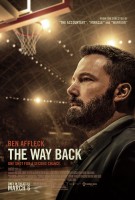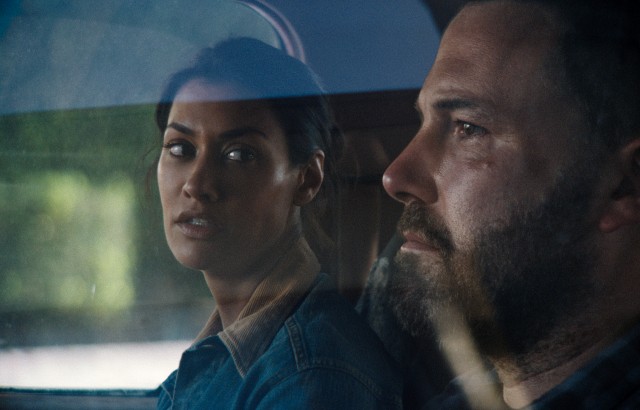The Way Back (2020) Movie Review
 |
The Way Back
Theatrical Release: March 6, 2020 / Running Time: 110 Minutes / Rating: R Director: Gavin O' Connor / Writer: Brad Inglesby Cast: Ben Affleck (Jack Cunningham), Al Madrigal (Dan), Janina Gavankar (Angela), Michaela Watkins (Beth), Brandon Wilson (Brandon Durrett), Will Ropp (Kenny Dawes), Fernando Luis Vega (Sam Garcia), Charles Lott Jr. (Chubbs Hendricks), Melvin Gregg (Marcus Parrish), Ben Irving (Bobby Freeze), Jeremy Radin (Father Mark Whelan), John Aylward (Father Edward Devine), Da'Vinchi (Devon Childress), Matthew Glave (Coach Lombardo), Nancy Linehan Charles (Anne), Glynn Turman (Doc), T.K. Carter (Russ Durrett), Jeremy Ratchford (Matty - Bartender), Dan Lauria (Gerry Norris) |
Ben Affleck has had more ups and downs over the past twenty-five years than most people in the film business have in a lifetime. Affleck emerged as an Oscar-winning co-writer and standout co-star to Matt Damon in 1997's Good Will Hunting. Stardom immediately followed, but even when Affleck's movies made a lot of money (Armageddon, Pearl Harbor), they weren't too highly regarded. By 2003, Affleck was a punchline and films like Gigli, Daredevil, and Surviving Christmas are still considered some of the worst of their time. Affleck rebounded by returning behind the camera, When you're on top, the only place to go is down. That's where Affleck went, separating from Jennifer Garner in 2015 after ten seemingly blissful years of high-profile marriage. Then Affleck was cast as Batman, which hardly seems like a bad thing, but the poor reception given to Batman v Superman: Dawn of Justice and even more so Justice League erased any possibility of DC echoing Marvel's renaissance or Affleck having a signature superhero role to rival the respected likes of Christian Bale and Robert Downey Jr. Affleck's return behind the camera in between his two Batman movies -- his late 2016 Dennis Lehane adaptation Live by Night -- was a big time box office flop and awards season nonstarter.
In the years since, Affleck finalized his divorce from Garner, gained noticeable weight and returned to rehab for alcohol abuse issues, but not before TMZ caught him drunkenly stumbling around outside a Halloween party last fall. The incident would have been even more embarrassing had it taken place shortly after Affleck's addiction/basketball drama The Way Back was scheduled to open. But the movie had already been pushed back to March 2020, where it now has the air of being the perfect comeback vehicle for Affleck, as it deals with some of the very issues that have haunted him the past few years including extreme drinking and a family's dissolution.
Affleck plays Jack Cunningham, a one-time star athlete who is tapped to coach his old high school, Bishop Hayes. Jack's athletic prowess didn't take him anywhere special. In middle age, he's separated and getting through his manual labor job with a stealthy parade of beer and hard liquor. Jack comes up with a number of reasons to turn down the job offer. He has never coached and he hasn't had anything to do with basketball since he stepped away from the game in college. He rehearses his rejection voicemail over and over while going through countless cans of beers that are put through his fridge-to-freezer cycle.
Of course, Jack ultimately takes the job, which you know not only from the poster and trailer but from the fact that this film is directed by Gavin O'Connor, who has displayed a taste for sports dramas in the esteemed Disney hockey flick Miracle and the oddly beloved mixed martial arts sibling drama Warrior. O'Connor and Affleck previously collaborated on 2016's The Accountant, a commercial but not critical hit for which a sequel has been promised but not officially scheduled for years.
The two have much better success here, mostly just by creating a flawed protagonist and allowing us to sympathize with him as he copes with decades of anguish primarily by drinking all the time. This is no Manchester by the Sea, that arresting tragic drama that earned the aforementioned Casey a Best Actor Oscar, but it comes from a similar place and the elder Affleck is extremely compelling here, the relatbility of his character's woes as plain to see as the extra pounds he's carrying around.
As a sports film, The Way Back is as formulaic as its title is generic. I don't know that there really is a way to tell a fictional team's rags-to-riches journey without reminding you of other movies. But Affleck is a powerful anchor to it all and his dark, distinct lens paints minor characters' arcs as episodes of reflection and self-discovery that are key to the redemption we crave for this antihero. When you think the movie has arrived at its happy conclusion, complete with a freeze frame on a contented Coach C, you're surprised to find that O'Connor isn't done just yet and that redemption won't come that easily for our deeply wounded and insufficiently rehabilitated lead. The final act has surprises and supplies as much bitterness as sweetness. It pushes the film closer to two hours but also away from being a standard issue team sports movie.
Even if I hadn't been tapped to take a detailed survey about the film's trailer a couple of months back, I would still come away with the impression that this is the kind of adult drama that gives major studios pause in 2020. Affleck may be famous and better liked than someone with so many clunkers might ordinarily be, but no movie star is immune to flops and even with its modest $21 million reported production budget, it's the kind of gamble many studios are shying away from. Warner especially has to be uneasy after their mid-range R-rated dramas The Goldfinch, Motherless Brooklyn, The Good Liar, and Richard Jewell all bombed last year. Despite strong reviews and a dynamite PR campaign that included a big New York Times profile of the leading man and the demons he's battling, The Way Back could very well struggle to find an audience opening across from Pixar's Onward. Should that happen, Affleck's next shots at redemption will come as a lead in the fall thriller Deep Water from Fatal Attraction director Adrian Lyne and as a supporting player, writer, and executive producer on Ridley Scott's seemingly awards-poised epic The Last Duel.
|
Related Reviews:
DVDizzy.com | DVD and Blu-ray Reviews | New and Upcoming DVD & Blu-ray Schedule | Upcoming Cover Art | Search This Site
DVDizzy.com Top Stories:
Ben Affleck: The Accountant • Argo • Batman v Superman: Dawn of Justice • Gone Girl | Directed by Gavin O'Connor: Miracle | Written by Brad Ingelsby: Run All Night
Don't Worry, He Won't Get Far on Foot • A Star Is Born (2018) • The Judge • Glory Road • Win Win
Now in Theaters: Onward • Birds of Prey • Bad Boys For Life
Text copyright 2020 DVDizzy.com. Images copyright 2020 Warner Bros. Pictures, Bron Creative, Jennifer Todd Pictures, Mayhem Pictures, and Film Tribe Productions.
Unauthorized reproduction prohibited.

